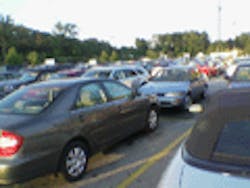Storm Water Fee to Hit Milwaukee Parking Lot Owners Hard
Milwaukee businesses that have surface parking lots will be assessed storm water management fees starting in July that will add $13 million annually to the city's sewer maintenance fund.
According to a report in the Business Journal of Milwaukee, the storm water fee was part of Mayor Tom Barrett's 2006 city budget and was approved by the Common Council in July 2005.
Businesses hit hardest by the storm water fee are shopping centers and companies that operate large surface parking lots, said Mike Kenney, general manager of CPS Parking of Wisconsin Inc., Milwaukee.
"This is an additional tax that flew under the radar," Kenney said.
CPS Parking operates 19 surface parking lots in the city. The largest is a 15-acre lot at 5201 S. Howell Ave. near General Mitchell International Airport that is used for long-term parking by air travelers. The airport lot will be assessed an estimated $12,000 in storm water fees annually. The property taxes on the lot have increased fivefold to $250,000 in 2006. Five years ago, CPS paid $50,000 in property taxes.
"Honestly, the fees and taxes are a significant burden," Kenney said.
Milwaukee assessed CPS' airport parking lot at $10 million in 2006. CPS is appealing the assessment.
The Milwaukee storm water fee is based on the amount of impervious surface of each commercial property, said Mark Nicolini, the city's budget and management director. Impervious surfaces, such as parking lots, do not allow storm water to penetrate into the soil.
A typical Milwaukee business will pay $50 per quarter for every 10,000 square feet of parking lot. A business with a 1-acre parking lot will pay a storm water fee of approximately $800 per year.
Inland U.S. Management L.L.C., Oak Brook, Ill., did not oppose the implementation of the storm water fee when it was introduced in 2005, said Lindsay Burke, a spokeswoman for the company that owns Milwaukee's Midtown Center near North 60th Street and West Capitol Drive.
Inland's 60-acre Midtown Center has several parking lots totaling about 15 acres and will be adding additional surface parking with an $11 million expansion scheduled for later in 2006.
Nicolini defends the city's storm water fee as a revenue source that is fairer than the previous sewer maintenance fund assessment that was based on the amount of wastewater a property delivers to the sewerage system.
Businesses that produced little wastewater, based on tap water usage, but had large surface parking lots, did not pay their fair for the sewer maintenance fund, said Nicolini. Runoff from parking lots previously was not factored into the fee structure.
Properties that rely on the sewer system to manage their storm water, but use little tap water, are currently subsidized by users who pay for the system through the sewerage charge on wastewater, said Nicolini.
By implementing the storm water fee, residential property owners will pay less in sewer maintenance fees, said Nicolini. He estimates that if the commercial storm water fee had not been enacted, every residential property owner in the city would pay up to $6 more per year for sewer maintenance costs.
Source: BJM
